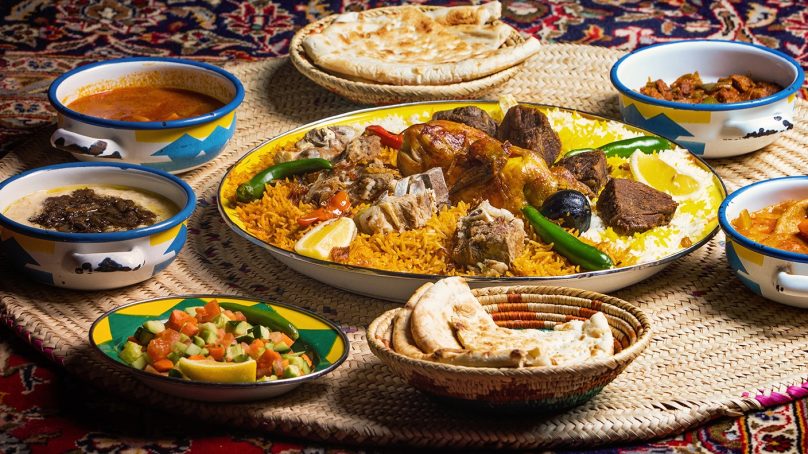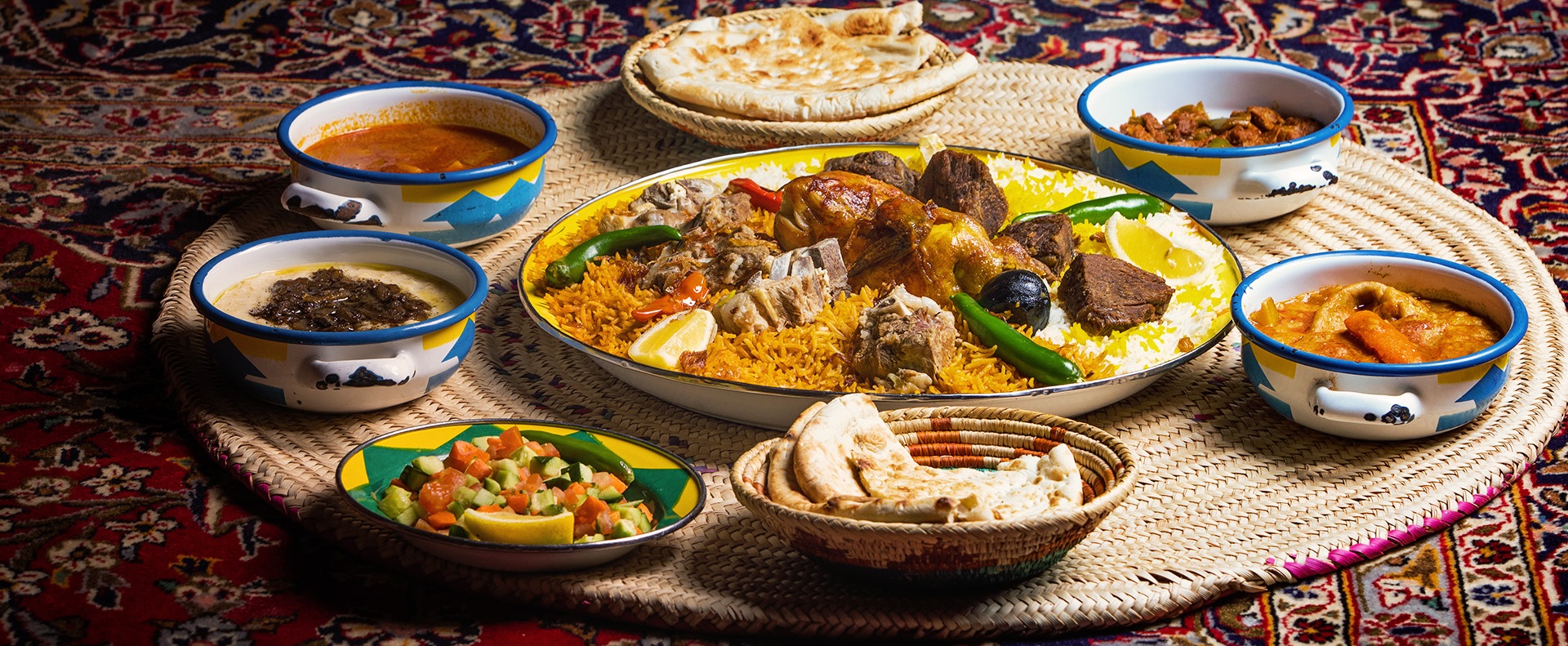

Saudi cuisine
Saudi cuisine is characterized by a blend of traditional flavors, spices and cultural influences. The use of aromatic herbs, such as cumin, coriander, cinnamon and cardamom, creates rich and flavorful dishes. Furthermore, dates and Arabic coffee also play a significant role, symbolizing hospitality and tradition. The staple food in Saudi Arabia is rice, often accompanied by lamb, chicken or fish. Additionally, kabsa is a staple traditional dish.
Furthermore, Saudi cuisine mirrors geographical diversity, featuring seafood in coastal areas and Bedouin-inspired dishes influenced by the desert. Additionally, the concept of communal dining is strong, with families and friends sharing meals from large platters. Overall, Saudi cuisine stands out for its rich flavors, cultural significance and the integration of traditional ingredients, which makes it a unique and integral part of the country’s identity.
Regional differences
Saudi cuisine exhibits regional differences. It is influenced by the country’s diverse geography and cultural influences. Along the Red Sea, seafood plays a prominent role in the culinary landscape. For example, dishes like sayadieh showcase the coastal influence on Saudi cuisine.
In the southern regions, particularly in areas like Asir, there is a stronger emphasis on vegetables and grains. Here, dishes like hareesah, a type of porridge made with wheat and meat, are popular.
Furthermore, southern cuisine reflects the region’s agricultural abundance. In the central Najd region, which includes the capital city Riyadh, traditional dishes, like jareesh, take center stage. Consequently, each area contributes to the unique flavors and culinary traditions that make Saudi Arabian food culturally rich and diverse.
Cultural and social attributes
Saudi cuisine is deeply intertwined with cultural and social aspects. One of the most important elements is hospitality, a cherished cultural value. Offering food to guests is a symbol of generosity and warmth, reflecting the traditional Arabian hospitality. Dates and Arabic coffee are often served as a gesture of welcome.
The communal aspect of dining is crucial in Saudi culture. Families and friends gather to share meals from a typical dish. This communal dining is evident during special occasions and celebrations.
Religious influences also shape Saudi cuisine. Thus. Islamic dietary laws emphasize halal practices. Consequently, religious adherence impacts the choice of ingredients and food preparation methods. Furthermore, Saudi cuisine is a means of preserving and expressing cultural identity.
Popular cooking methods
Traditional cooking methods in Saudi cuisine reflect the country’s cultural and historical influences. One prevalent method is grilling or roasting, often done in open-air settings.
Another common cooking method is stewing, where meats and vegetables are slow cooked in aromatic broths. Furthermore, popular ingredients in Saudi cuisine include rice, wheat and barley, forming the base for many dishes.
Meat, especially lamb and chicken, is widely used and often cooked with rice or incorporated into stews. Additionally, seafood is prevalent in coastal areas, adding diversity to the cuisine.
Saudi cuisine uses a distinct blend of spices, including cumin, coriander, cinnamon, cardamom and cloves. These spices contribute to the rich and aromatic flavor profile of many dishes. Additionally, saffron is often used for its distinctive color and taste, particularly in rice-based dishes like kabsa. As for dates, they are used as a common sweetener and snack.
Saudi cuisine evolution
Traditional Bedouin and Arabian culinary practices form the foundation of Saudi cuisine.
Historically, trade routes passing through the Arabian Peninsula introduced new ingredients and cooking techniques. Additionally, the Silk Road facilitated the exchange of goods and culinary practices.
The Ottoman Empire controlled parts of the Arabian Peninsula, influencing Saudi cuisine with dishes. Moreover, Indian and Persian culinary influences are evident in specific spice blends and dishes.
Globalization and increased connectivity have recently introduced a fusion of international flavors to Saudi cuisine.
Latest food trends in Saudi cuisine
Modern interpretations
Chefs and home cooks alike have been experimenting with traditional recipes, giving them a modern twist. This includes innovative presentations, ingredient substitutions, or new cooking techniques for classic Saudi dishes.
Health and wellness
A global focus on health and wellness has led to increased interest in nutritious and plant-based options. This trend might influence Saudi cuisine. Thus, there is a greater emphasis on fresh, locally sourced produce and various plant-based dishes.
Global fusion
The fusion of different culinary traditions and flavors has been a growing trend. Consequently, this manifests in incorporating international ingredients or cooking methods into traditional recipes in Saudi Arabia.
Sustainable and local ingredients
There has been a global push towards sustainability and using locally sourced ingredients. In Saudi cuisine, this could translate to a greater emphasis on tradition. Therefore, locally grown produce and sustainable practices in food preparation.
The future of Saudi gastronomy
Chefs and food enthusiasts will continue to explore innovative ways to present and prepare traditional Saudi dishes, thereby experimenting with new ingredients, techniques or creative fusion concepts. Furthermore, aside from embracing innovation, there will be a concerted effort to preserve and promote traditional Saudi culinary heritage. Consequently, they will prominently celebrate regional specialties at every event.

Chef Rakan Aloraifi,
chef and founder of KIT Catering
@kitcatering.sa
@raloraifi













